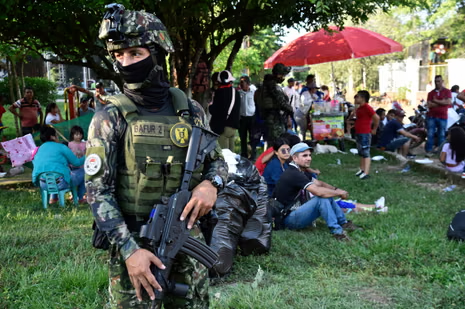Colombian President Gustavo Petro declared a state of emergency as leftist rebel attacks in the Catatumbo region claimed over 100 lives and displaced more than 20,000 people, marking a dramatic escalation in violence that threatens Colombia’s fragile peace process and regional stability. The government’s declaration of “war” against the National Liberation Army (ELN) signals the failure of peace negotiations and the return of serious armed conflict to Colombia.
ELN Offensive Shatters Peace Efforts
The National Liberation Army’s coordinated attacks across the Catatumbo region represent the most serious challenge to Colombian government authority in years, effectively ending hopes for a negotiated settlement with the country’s last major guerrilla group. The scale and intensity of the violence demonstrate the ELN’s continued military capability and willingness to engage in open confrontation with government forces.
These attacks come despite years of on-and-off peace negotiations between the Petro administration and ELN leadership, suggesting fundamental disagreements about the group’s future role in Colombian society and politics. The timing of the offensive, coinciding with increased coca production and territorial disputes, indicates the complex relationship between armed groups, drug trafficking, and local governance in rural Colombia.
The Catatumbo region, located along the Venezuelan border, has historically been contested territory where multiple armed groups compete for control over lucrative drug trafficking routes and illegal mining operations. The ELN’s decision to escalate violence in this area suggests strategic calculations about territorial control and revenue generation that supersede peace process commitments.
Humanitarian Crisis and Population Displacement
The forced displacement of over 20,000 people represents one of Colombia’s largest internal displacement crises in recent years, overwhelming local humanitarian response capacity and highlighting the civilian cost of renewed armed conflict. Families fleeing the violence face uncertain futures in overcrowded displacement camps with limited access to basic services.
The humanitarian crisis extends beyond immediate displacement to include restricted access for international aid organizations, disrupted agricultural production, and suspended educational and health services in affected areas. These broader impacts demonstrate how localized violence can cascade into regional instability with lasting consequences for civilian populations.
Children represent a particularly vulnerable population within the displaced communities, facing trauma from witnessed violence, separation from family members, and disrupted education that can have lifelong developmental consequences. The scale of child displacement raises concerns about long-term social stability and the cycle of violence in Colombian society.
Government Response and Military Strategy
President Petro’s declaration of “war” against the ELN marks a significant shift from his administration’s preferred approach of negotiated settlement and peaceful resolution. This rhetorical escalation suggests recognition that diplomatic engagement has failed and that military action represents the only viable response to ELN aggression.
The state of emergency grants the government expanded powers to deploy military forces, restrict movement, and allocate resources for counter-insurgency operations. However, the effectiveness of these measures depends on the Colombian military’s capacity to operate in difficult terrain against guerrilla forces with intimate knowledge of local geography and civilian support networks.
The Colombian government faces the challenge of conducting military operations while minimizing civilian casualties and avoiding the human rights violations that characterized earlier phases of the country’s internal conflict. International observers will closely monitor government forces’ conduct during counter-insurgency operations to ensure compliance with international humanitarian law.
Regional Implications and Venezuelan Connections
The violence in Catatumbo has significant implications for Venezuelan-Colombian relations, as the border region serves as a corridor for migration, drug trafficking, and armed group operations. The ELN’s presence on both sides of the border complicates military responses and raises questions about Venezuelan government cooperation in addressing cross-border security challenges.
Venezuelan political instability and economic crisis have created conditions that benefit armed groups operating in border regions, providing recruitment opportunities, territorial control, and revenue generation through various illegal activities. The Colombian government’s ability to address ELN violence may depend partly on broader regional stability and Venezuelan government cooperation.
The proximity to major drug trafficking routes connecting Colombian production centers with international markets means that ELN territorial control in Catatumbo has implications for global drug flows and related violence. Success or failure in addressing this violence will influence broader counter-narcotics efforts and regional security dynamics.
American Interests and Security Cooperation
The escalation of Colombian violence directly affects American security interests, particularly counter-narcotics efforts and regional stability initiatives. The United States has invested billions in Colombian security assistance over decades, and the ELN’s resurgence raises questions about the sustainability of these investments and the effectiveness of current cooperation frameworks.
American policymakers must balance support for Colombian government counter-insurgency efforts with human rights concerns and broader regional stability objectives. The outcome of Colombia’s confrontation with the ELN could influence similar challenges in other Latin American countries facing armed group violence and territorial control issues.
The Colombian crisis also highlights the complex relationship between peace processes, democratic governance, and security challenges in Latin America. American support for Colombian democracy includes helping address the root causes of armed conflict, including inequality, rural development, and alternative economic opportunities for communities currently dependent on illegal economies.
As Colombia confronts renewed violence from the ELN, the international community faces difficult questions about supporting peace processes, addressing humanitarian crises, and maintaining regional stability. The success or failure of Colombia’s response will have implications far beyond its borders, influencing approaches to armed conflict resolution and democratic consolidation throughout Latin America.






